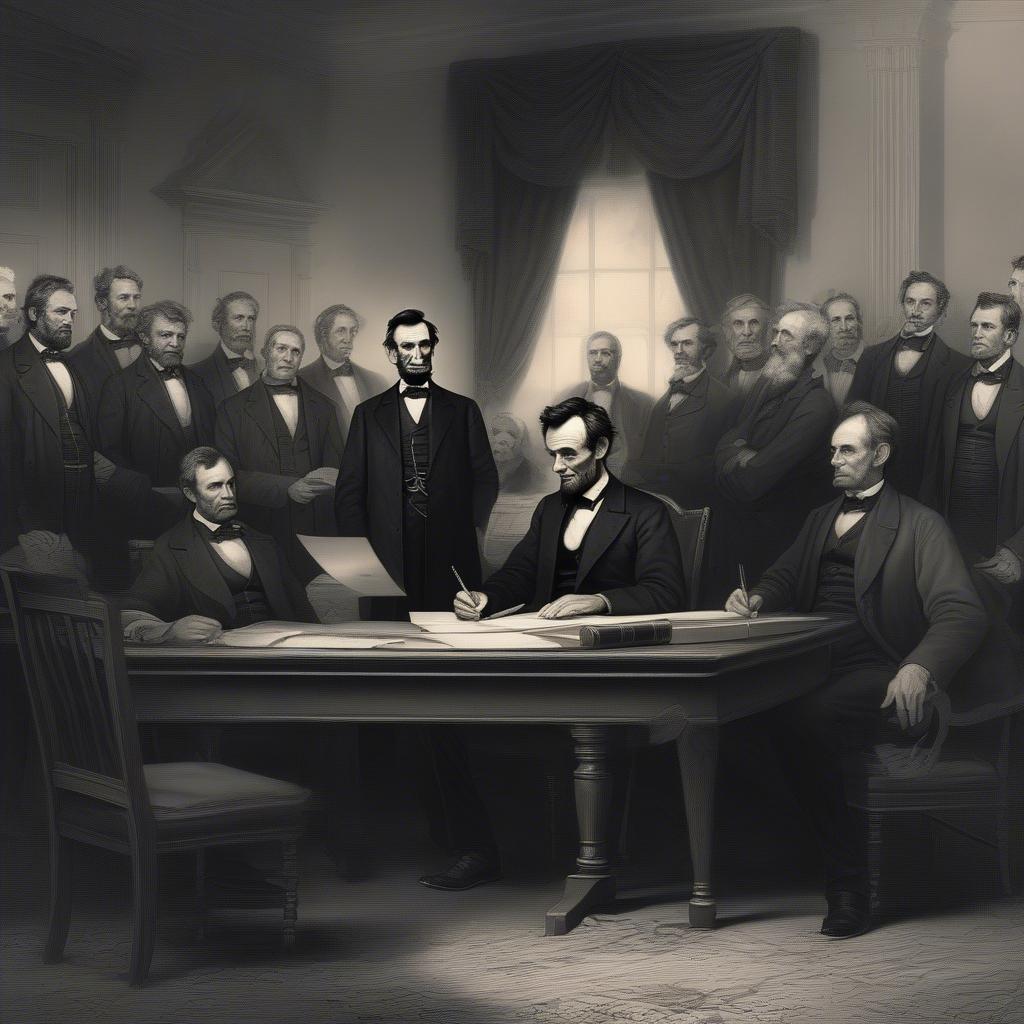
The Emancipation Proclamation, a pivotal document in American history, is often solely attributed to Abraham Lincoln. While Lincoln’s signature undeniably set the wheels of freedom in motion, the story of its creation and implementation is far more intricate. So, Who Was Involved In The Emancipation Proclamation Other Than Lincoln? This article delves into the key figures and influences that shaped this landmark declaration.
Table Content:
The political landscape of the time played a significant role in the Proclamation’s development. Abolitionists, both within and outside the government, exerted considerable pressure on Lincoln to take decisive action against slavery. Figures like Frederick Douglass, a prominent abolitionist writer and orator, publicly advocated for emancipation and challenged Lincoln’s initial cautious approach. Douglass’s powerful words and unwavering stance helped sway public opinion and create a moral imperative for change.
Within Lincoln’s cabinet, Secretary of State William Seward played a crucial role in advising the president on the timing and wording of the Proclamation. Seward cautioned against issuing it too early in the war, fearing it might appear as a desperate measure and alienate border states. His strategic counsel helped ensure the Proclamation’s effectiveness when it was finally issued.
Salmon P. Chase, Secretary of the Treasury, also contributed significantly. A staunch antislavery advocate, Chase pushed for immediate emancipation and influenced the Proclamation’s focus on freeing slaves in Confederate-held territory. His involvement reflected the growing sentiment within the administration that slavery must be addressed as a central issue of the war.
Beyond the political sphere, the enslaved people themselves played a vital, albeit often unacknowledged, role. Their acts of resistance, such as fleeing plantations and joining the Union army, demonstrated their unwavering desire for freedom and put immense pressure on the Union government to act. These acts of courage challenged the very foundation of the Confederacy and strengthened the moral argument for emancipation.
 Emancipation Proclamation Signing Ceremony
Emancipation Proclamation Signing Ceremony
The Emancipation Proclamation was not simply a document drafted in isolation. It was the culmination of political maneuvering, moral persuasion, and the courageous actions of those fighting for their own liberation. Understanding the broader context of its creation allows us to appreciate the complex interplay of forces that led to this transformative moment in American history. Who was involved in the Emancipation Proclamation other than Lincoln? The answer, as we have seen, encompasses a diverse cast of characters, each contributing to the document’s ultimate impact.
The influence of the Proclamation extended beyond American borders. European powers, particularly Great Britain and France, were closely watching the unfolding events in the United States. The Emancipation Proclamation made it politically difficult for these nations to support the Confederacy, as it framed the war as a fight against slavery. This international dimension further underscores the Proclamation’s significance.
 Frederick Douglass meeting with Abraham Lincoln
Frederick Douglass meeting with Abraham Lincoln
While the Proclamation did not immediately free all enslaved people, it served as a crucial stepping stone toward the eventual abolition of slavery. It transformed the war from a struggle to preserve the Union into a fight for human freedom, inspiring hope and galvanizing support for the Union cause.
“The Emancipation Proclamation was a strategic masterpiece,” notes Dr. Eleanor Vance, a historian specializing in the Civil War era. “It skillfully balanced moral imperative with political pragmatism, ultimately shifting the course of the war and the nation.”
 African American Soldiers in the Civil War
African American Soldiers in the Civil War
“It’s crucial to remember the contributions of those who fought for their own freedom,” adds Professor Samuel Johnson, a scholar of African American history. “Their bravery and resilience were instrumental in pushing the issue of emancipation to the forefront.”
“The Emancipation Proclamation’s impact resonated far beyond American shores,” observes Dr. Maria Hernandez, a historian of international relations. “It significantly influenced the global perception of the conflict and limited the Confederacy’s ability to secure foreign support.”
The Emancipation Proclamation remains a powerful symbol of hope and perseverance in the face of injustice. It reminds us that social change often requires the combined efforts of many individuals, both prominent and unsung, working towards a common goal.
Conclusion
The Emancipation Proclamation, while signed by Abraham Lincoln, was the product of a complex interplay of political, social, and moral forces. Understanding who was involved in the Emancipation Proclamation other than Lincoln allows us to fully appreciate the significance of this landmark document and its lasting legacy. From abolitionist leaders to cabinet members, and most importantly, the enslaved people themselves, each played a crucial role in shaping the course of history.
FAQ
- What was the main purpose of the Emancipation Proclamation?
- Did the Emancipation Proclamation free all slaves?
- What was the reaction to the Emancipation Proclamation in the South?
- How did the Emancipation Proclamation affect the Union war effort?
- What was the role of Frederick Douglass in the push for emancipation?
- How did the Emancipation Proclamation impact international relations?
- What is the lasting legacy of the Emancipation Proclamation?